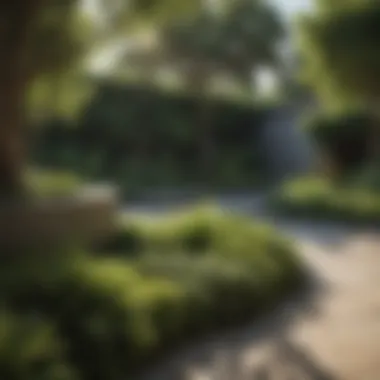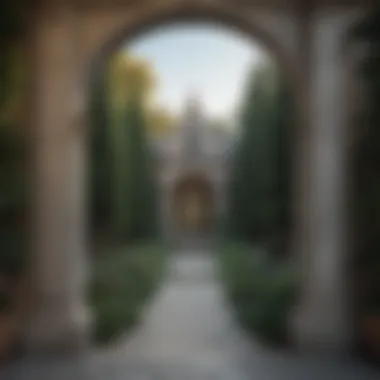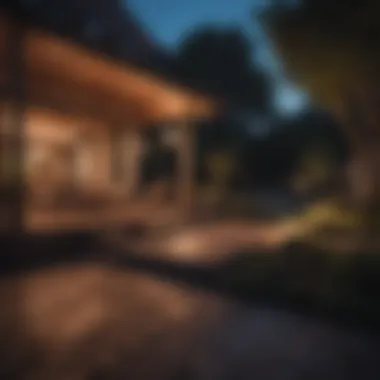Elevating Outdoor Living: Unveiling the World of Landscape Design Organizations


Outdoor Decor Ideas
Landscape design organizations play a pivotal role in curating outdoor spaces that harmoniously blend with their natural surroundings. By meticulously selecting plant arrangements, incorporating decorative lighting, and offering sustainable hardscaping solutions, these organizations elevate outdoor decor to a new level of sophistication and environmental consciousness.
Seasonal Inspirations
Every season brings its own unique color palette and ambiance to outdoor spaces. Landscape design organizations expertly capture these seasonal inspirations, transforming gardens and patios into vibrant showcases of nature's beauty.
Furniture Selection
The choice of outdoor furniture is critical in creating both functional and aesthetically pleasing outdoor living areas. Landscape design organizations collaborate with top designers to curate furniture selections that combine comfort, durability, and style.
Decorative Lighting
Lighting is a key element in enhancing outdoor decor and extending the usability of outdoor spaces into the evening hours. Landscape design organizations artfully design lighting schemes that accentuate architectural features and create a warm, inviting atmosphere.
Plant Arrangements
Plants are the soul of outdoor spaces, breathing life and character into gardens and landscapes. Through expert plant arrangements, landscape design organizations create harmonious compositions that evolve with the seasons, ensuring year-round appeal.
Hardscaping Solutions
In addition to vegetation, hardscaping elements such as pathways, patios, and water features are essential components of outdoor design. Landscape design organizations integrate sustainable hardscaping solutions to complement the natural environment while providing functionality and visual interest.
Introduction to Landscape Design Organizations
In the realm of outdoor living, the role of Landscape Design Organizations stands as a vital force in shaping the very environments we inhabit. These organizations serve as the architects of outdoor spaces, meticulously crafting landscapes that not only please the eye but also function harmoniously with the surroundings. As we embark on this journey of exploration into Landscape Design Organizations, we uncover the intricate tapestry of their operations, services, and profound impact on outdoor living.
Defining Landscape Design Organizations
Delving into the essence of Landscape Design Organizations unveils a realm where creativity meets functionality. These entities are the masterminds behind the creation and transformation of outdoor spaces, bringing to life visions that seamlessly blend aesthetics with practicality. Through a meticulous process of planning, designing, and executing, Landscape Design Organizations breathe life into barren lands, turning them into vibrant oases of beauty and functionality.


Evolution of Landscape Design Industry
The evolution of the Landscape Design Industry echoes a narrative of innovation, adaptation, and sustainability. From its humble beginnings as a niche profession to its current status as a pivotal player in the realm of architecture and environmental design, this industry has traversed a remarkable path. Embracing technology, integrating eco-friendly practices, and aligning with changing societal needs, Landscape Design Organizations have not just evolved but have redefined the very essence of outdoor living.
Significance of Landscape Design in Modern Context
In today's contemporary landscape, the significance of Landscape Design extends beyond mere aesthetics. It plays a crucial role in mitigating environmental impact, promoting sustainability, and enhancing the overall well-being of communities. As we navigate a world grappling with urbanization and climate change, Landscape Design Organizations emerge as beacons of hope, embodying the fusion of artistry and purpose in creating outdoor spaces that inspire, heal, and endure.
Foundations of Landscape Design Organizations
In this fascinating segment of the article, we delve into the essential underpinnings of landscape design organizations, unveiling the core pillars that support their operations. The foundations of these organizations serve as the bedrock upon which their entire modus operandi is structured. Through a meticulous examination of their roots, we gain profound insights into the ethos and principles that drive their industry-altering initiatives.
Key to understanding the relevance of Foundations of Landscape Design Organizations in the broader context of this article is the acknowledgment that these principles act as guiding beacons, directing the trajectory of innovation and sustainable practices within the field. By navigating through the foundational layers of these entities, readers are offered a nuanced perspective on the evolution of landscape design as a dynamic discipline, continually adapting to societal needs and environmental challenges.
Key Principles and Philosophies
Central to the ethos of landscape design organizations are a set of core principles and philosophies that underpin every aspect of their endeavors. These guiding tenets serve as the compass, steering their design processes, project implementations, and interactions with the natural environment. From the pursuit of harmony between built structures and the surrounding landscapes to the commitment to creating spaces that enhance both aesthetics and functionality, these principles encapsulate the essence of their creative vision.
Integrating principles such as sustainability, biodiversity conservation, and community engagement, landscape design organizations champion a holistic approach to outdoor spaces, striving to weave together ecological sensitivity with artistic ingenuity. By elucidating these fundamental principles, readers can appreciate the intricate tapestry of considerations that inform every decision made by these organizations, transcending mere design to embody a deeper ethos of responsible stewardship.
Role of Sustainability in Landscape Design
A paramount concern within the realm of landscape design is the pivotal role played by sustainability in shaping the built environment. From the selection of materials to the design of green spaces, sustainability lies at the heart of every decision made by landscape design organizations. Embracing a harmonious coexistence between nature and human intervention, these entities navigate the delicate balance between conservation and development.
Incorporating sustainable practices not as mere add-ons but as foundational elements, landscape design organizations pave the way for a future where outdoor spaces are not just visually appealing but also environmentally conscious. Through an exploration of the multifaceted dimensions of sustainability in landscape design, readers are invited to envision a world where beauty seamlessly integrates with responsible resource management, creating spaces that stand as testaments to lasting ecological stewardship.
Innovative Techniques and Technologies
At the forefront of landscape design innovation lie the pioneering techniques and cutting-edge technologies that redefine the boundaries of possibility. Landscape design organizations leverage the latest advancements in digital tools, sustainable materials, and construction methodologies to execute projects that push the envelope of creativity and functionality. By harnessing innovation as a catalyst for transformation, these entities set new standards for excellence in the industry.
From augmented reality modeling to drone-based land surveys, innovative techniques are revolutionizing the way landscapes are envisioned, planned, and brought to life. Through a detailed exploration of these groundbreaking methodologies, readers are introduced to a realm where imagination meets technical prowess, resulting in outdoor spaces that resonate with ingenuity and progressive thinking.


Exploring Services Offered by Landscape Design Organizations
In the realm of landscape design organizations, the services offered play a crucial role in shaping outdoor spaces. This section delves into the pivotal aspects of these services and their significance within the broader landscape design narrative. Exploring Services Offered by Landscape Design Organizations is not merely about the execution of tasks; it encompasses a sophisticated orchestration of design consultation, meticulous planning, flawless execution, and ongoing support.
Design Consultation and Planning
Design consultation and planning form the foundational pillars of any successful landscape design project. This phase involves a meticulous analysis of the client's preferences, site conditions, and functional needs. Through in-depth consultations, landscape designers decipher the client's vision and translate it into a concrete plan. Factors such as site topography, environmental considerations, and budget allocations are intricately woven into the planning process. Attention to detail and creative problem-solving define this crucial stage, setting the groundwork for the transformation of outdoor spaces.
Execution and Implementation
Execution and implementation mark the transition from conceptualization to realization. This stage involves translating the intricate design plans into tangible outdoor landscapes. Skilled craftsmen, landscapers, and project managers collaborate to bring the vision to life. Precision, craftsmanship, and adherence to timelines characterize the execution phase. Quality control, material selection, and construction techniques are pivotal in ensuring the seamless implementation of design concepts. The successful execution of a project hinges on the harmonious coordination of various elements, culminating in the creation of visually stunning outdoor environments.
Maintenance and Continued Support
Maintenance and continued support are integral components that ensure the longevity and vibrancy of landscape designs. Beyond the completion of a project, landscape design organizations offer maintenance services to preserve the beauty and functionality of outdoor spaces. Regular upkeep, plant care, irrigation system management, and seasonal modifications are part of the maintenance regimen. Continuous support and guidance empower clients to evolve their outdoor spaces over time, adapting to changing needs and preferences. The provision of ongoing maintenance underscores the commitment of landscape design organizations to excellence and client satisfaction, fostering enduring relationships built on trust and quality service.
Impact of Landscape Design Organizations on Outdoor Living
In the realm of outdoor living, the influence of landscape design organizations is profound. These entities play a pivotal role in shaping outdoor spaces, not merely for visual appeal but also for enhancing functionality. By meticulously planning and executing design concepts, landscape design organizations elevate the aesthetics of outdoor environments while ensuring they serve practical purposes effectively. From residential gardens to public parks, every outdoor area benefits from the expertise and creativity of these organizations.
Enhancing Aesthetics and Functionality
The aspect of enhancing aesthetics and functionality is a fundamental pillar in the realm of landscape design. These organizations strive not only to create visually pleasing outdoor spaces but also to ensure that every design element serves a functional purpose. Whether it's crafting a serene garden retreat or designing a communal outdoor area, the balance between aesthetics and functionality is meticulously maintained. Every plant, pathway, and structure is carefully planned to not only look appealing but also to serve a specific function, enhancing the overall user experience.
Promoting Environmental Sustainability
Environmental sustainability is a core value integrated into the ethos of landscape design organizations. By promoting sustainable practices such as water conservation, native plant usage, and eco-friendly materials, these entities contribute to reducing the carbon footprint of outdoor spaces. Through thoughtful design choices and maintenance strategies, landscape design organizations lead the way in fostering environmental stewardship within the outdoor design industry. By prioritizing sustainability, these organizations not only create visually stunning landscapes but also ensure their longevity and positive impact on the ecosystem.
Fostering Community Engagement
One of the significant impacts of landscape design organizations is their ability to foster community engagement through outdoor spaces. By creating inviting and functional areas for public interaction, these organizations facilitate social connections and community gatherings. From urban parks designed for recreation to neighborhood gardens that promote local sustainability, landscape design organizations are instrumental in enhancing the social fabric of communities. The thoughtful design of outdoor spaces encourages people to connect with nature and each other, fostering a sense of belonging and pride within the community.


Case Studies and Success Stories
In this meticulously crafted article, delving into the realm of landscape design organizations, Case Studies and Success Stories play a pivotal role in illustrating the real-world impact and efficacy of these entities. Through detailed examination and analysis, readers are able to grasp the tangible benefits and nuances that come with successful projects in landscape design. These case studies serve as practical examples, highlighting the application of key principles and innovative techniques in varying contexts, showcasing the transformative power of landscape design on outdoor living environments.
Notable Projects by Leading Landscape Design Organizations
Impact of Central Park Conservancy
The Impact of Central Park Conservancy stands out as a beacon of excellence in the landscape design realm, embodying a harmonious blend of aesthetics, functionality, and sustainability. This renowned project not only beautifies the urban landscape but also contributes significantly to enhancing community well-being and environmental preservation. The key characteristic of the Impact of Central Park Conservancy lies in its holistic approach towards green spaces, fostering a sense of tranquility amidst the bustling cityscape. Its unique feature of incorporating diverse plant species and eco-friendly design elements sets it apart as a paragon of sustainable urban development, making it a preferred choice for inclusion in this article.
Sustainable Initiatives by HOK Landscape Architecture
The Sustainable Initiatives by HOK Landscape Architecture showcase a commitment to ecological responsibility and innovative design solutions in the field of landscape architecture. With a focus on resource conservation and environmental stewardship, this project exemplifies the integration of sustainability principles into design practices, ensuring long-term viability and resilience. The key characteristic of Sustainable Initiatives by HOK Landscape Architecture lies in its forward-thinking approach to green infrastructure, promoting biodiversity and mitigating environmental impact. Through strategic planning and effective implementation, this project offers a sustainable blueprint for future landscape design endeavors, making it a valuable addition to this article.
Innovative Designs by West Urban Design & Landscape Architecture
The Innovative Designs by West 8 Urban Design & Landscape Architecture epitomize creativity, vision, and boundary-pushing concepts in the realm of landscape architecture. By reimagining outdoor spaces and challenging traditional design norms, this project showcases the transformative potential of innovative thinking in shaping the built environment. The key characteristic of Innovative Designs by West 8 Urban Design & Landscape Architecture lies in its ability to evoke emotion, provoke thought, and create memorable experiences for users. With a keen eye for detail and a passion for experimentation, this project redefines the boundaries of conventional landscape design, offering a fresh perspective on urban livability and connectivity. Its unique feature of blending art, architecture, and nature seamlessly sets it apart as a trailblazer in the industry, marking it as a standout choice for inclusion in this article.
Client Testimonials and Feedback
Client Testimonials and Feedback serve as a vital component in discerning the success and impact of landscape design organizations on their clients and communities. These testimonials provide firsthand accounts of the experiences and interactions clients have had with these organizations, shedding light on the intrinsic value and quality of their services. By showcasing genuine feedback and testimonials from satisfied clients, readers can gauge the level of professionalism, creativity, and client-centric focus that landscape design organizations bring to their projects. This section offers a glimpse into the user experience and satisfaction levels derived from working with these esteemed organizations, revealing the profound impact they have on shaping outdoor spaces and enriching lives.
Emerging Trends and Future Outlook
Exploring the Future Outlook in landscape design organizations is paramount to understanding the evolving nature of outdoor living spaces. As technology continues to permeate every aspect of our lives, including design practices, the Integration of Technology in Landscape Design is a pivotal point of discussion. From smart irrigation systems to virtual reality simulations for client presentations, technology is revolutionizing how landscapes are envisioned and created. This integration not only streamlines design processes but also enhances sustainability efforts through precise resource management and data-driven decision-making.
Integration of Technology in Landscape Design
The integration of technology in landscape design represents a paradigm shift in the industry, catalyzing more efficient and environmentally conscious practices. Smart sensors embedded in outdoor environments enable real-time monitoring of plant health and water usage, optimizing maintenance schedules and reducing water wastage. Furthermore, the use of drones for aerial surveys and 3D modeling enhances precision in project planning and execution. Embracing technology not only elevates the aesthetic appeal of outdoor spaces but also contributes to long-term sustainability by minimizing ecological footprint and maximizing operational effectiveness.
Focus on Wellness and Biophilic Design
Wellness and Biophilic Design are emerging as core principles in landscape architecture, responding to the growing need for spaces that nurture mental and physical well-being. Integrating elements like green walls, natural lighting, and interactive features promotes biophilia – the innate human connection to nature. These design approaches not only enhance the visual appeal of outdoor settings but also stimulate relaxation, creativity, and overall health for users. By prioritizing wellness and biophilic elements, landscape design organizations create harmonious environments that resonate with individuals at a profound level.
International Collaborations and Cross-Cultural Influences
In an increasingly interconnected world, landscape design is transcending geographical boundaries to embrace International Collaborations and Cross-Cultural Influences. Collaborating with designers from diverse backgrounds brings a rich tapestry of ideas, techniques, and aesthetics to projects, fostering innovation and cultural exchange. By blending various design philosophies and regional influences, landscape design organizations can create truly unique spaces that cater to global sensibilities while celebrating local heritage. These collaborations not only enrich the design process but also deepen the cultural significance of outdoor environments, creating spaces that transcend traditional boundaries.







